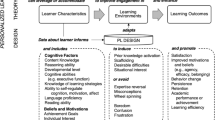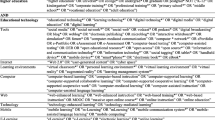Abstract
This paper introduces the MAPLET framework that was developed to map and link teaching aims, learning processes, learner expertise and technologies. An experimental study with 65 participants is reported to test the effectiveness of the framework as a guide to the design of lessons embedded within larger units of study. The findings indicate the potential of the MAPLET framework and reinforces the need to take a fresh approach to the design and development of curriculum that makes more effective use of the diminishing time available. It provides a conceptual model and working procedure that places the learner and the process of learning at the forefront of decisions.




Similar content being viewed by others
References
Anderson, J. R. (1982). Acquisition of cognitive skill. Psychological Review, 89(4), 369–406.
Anderson, J. R. (1993). Problem solving and learning. American Psychologist, 48(1), 35–44.
Anderson, L. W., Krathwohl, D. R., Airsasian, P. W., Cruikshank, K. A., Mayer, R. E., Pintrich, P. R., et al. (Eds.). (2001). A taxonomy for learning, teaching, and assessing: A revision of bloom’s taxonomy of educational objectives. New York: Longman.
Arnold, K.-H., Sandfuchs, U., & Wiechmann, J. (Eds.). (2009). Handbuch Unterricht (2nd ed.). Bad Heilbrunn: Klinkhardt.
Beck, K., & Krapp, A. (2006). Wissenschaftstheoretische Grundfragen der pädagogischen Psychologie. In A. Krapp & B. Weidenmann (Eds.), Pädagogische Psychologie (pp. 33–73). Weinheim: Beltz.
Biggs, J. B. (2003). Teaching for quality learning at university. Philadelphia: SRHE and Open University.
Borko, H., & Putnam, R. T. (1996). Learning to teach. In D. C. Berliner & R. C. Calfee (Eds.), Handbook of educational psychology (pp. 673–708). New York: Macmillian.
Bosch, K. (2006). Planning classroom management (2nd ed.). Thousand Oaks, CA: Corwin Press.
Bransford, J. D., Brown, A. L., & Cocking, R. R. (Eds.). (2000). How people learn: Brain, mind, experience, and school. Washington, DC: National Academy Press.
Bransford, J. D., & Schwartz, D. L. (1999). Rethinking transfer: A simple proposal with multiple implications. Review of Research in Education, 24, 61–100.
Bromme, R. (1981). Das Denken von Lehrern bei der Unterrichtsvorbereitung. Eine empirische Untersuchung zu kognitiven Prozessen von Mathematiklehrern. Weinheim: Beltz.
Bromme, R. (1992). Der Lehrer als Experte: Zur Psychologie des professionellen Wissens. Bern: Huber.
Campbell, D. T., & Stanley, J. C. (1963). Experimental and quasi-experimental designs for research. Boston, MA: Houghton Mifflin Company.
Chatti, M. A., Dyckhoff, A. L., Schroeder, U., & Thüs, H. (2012). A reference model for learning analytics. International Journal of Technology Enhanced Learning, 4(5–6), 318–331. doi:10.1504/IJTEL.2012.051815.
Chi, M. T. H., Glaser, R., & Rees, E. (1982). Expertise in problem solving. In R. J. Sternberg (Ed.), Advances in the psychology of human intelligence (pp. 1–75). Hillsdale, NJ: Lawrence Erlbaum.
Cohen, J. (1960). A coefficient of agreement for nominal scales. Educational and Psychological Measurement, 20(1), 37–46.
Cohen, J., & Cohen, P. (1983). Applied multiple regression/correlation analysis for the behavioral sciences (2nd ed.). Hillsdale, NJ: Lawrence Erlbaum Associates.
Dick, W., & Carey, L. (1996). The systematic design of instruction. New York: Harper Collins.
Ellis, R. A., & Goodyear, P. (2010). Students experiences of e-learning in higher education: The ecology of sustainable innovation. New York: Routledge.
Ericsson, K. A., & Lehmann, A. C. (1996). Expert and exceptional performance: Evidence of maximal adaptation to task constraints. Annual Review of Psychology, 47, 273–305. doi:10.1146/annurev.psych.47.1.273.
Ericsson, K. A., & Smith, J. (1991). Towards a general theory of expertise. Cambridge, MA: Cambridge University Press.
Fennema, E., & Franke, M. (1992). Teachers’ knowledge and its impact. In D. A. Grouws (Ed.), Handbook of research on mathematics teaching and learning (pp. 147–164). Reston, VA: National Council of teachers of Mathematics.
Ferguson, R. (2012). Learning analytics: Drivers, developments and challenges. International Journal of Technology Enhanced Learning, 4(5/6), 304–317. doi:10.1504/IJTEL.2012.051816.
Gosper, M. (2011). MAPLET—a framework for matching aims, processes, learner expertise and technologies. In D. Ifenthaler, P. Isaias, D. G. Sampson, & J. M. Spector (Eds.), Multiple perspectives on problem solving and learning in the digital age (pp. 23–36). New York: Springer.
Gosper, M., & McNeill, M. (2012). Implementing game-based learning: The MAPLET framework as a guide to learner-centred design and assessment. In D. Ifenthaler, D. Eseryel, & X. Ge (Eds.), Assessment in game-based learning: Foundations, innovations, and perspectives (pp. 217–234). New York: Springer.
Gosper, M., Woo, K., Muir, H., Dudley, C., & Nakazawa, K. (2007). Selecting ICT based solutions for quality learning and sustainable practice. Australasian Journal of Educational Technology, 23(2), 227–247.
Hacker, W. (2005). Allgemeine Arbeitspsychologie: Psychische regulation von Wissens-, Denk- und Körperlicher Arbeit. Bern: Verlag Hans Huber.
Hanke, U., Ifenthaler, D., & Seel, N. M. (2011). Modeling the world of instruction: Creative insight or learnt by advise? The Open Education Journal, 4(Suppl 1), 113–119.
Hatano, G., & Oura, Y. (2003). Commentary: Reconceptualizing school learning using insight from expertise research. Educational Researcher, 32(8), 26–29.
Ifenthaler, D. (2011). Identifying cross-domain distinguishing features of cognitive structures. Educational Technology Research and Development, 59(6), 817–840. doi:10.1007/s11423-011-9207-4.
Ifenthaler, D., Masduki, I., & Seel, N. M. (2011). The mystery of cognitive structure and how we can detect it. Tracking the development of cognitive structures over time. Instructional Science, 39(1), 41–61. doi:10.1007/s11251-009-9097-6.
Jonassen, D. H. (1999). Computers as mind tools for schools: Engaging critical thinking. Englewood Cliffs, NJ: Prentice Hall.
Jonassen, D. H., & Cho, Y. H. (2008). Externalizing mental models with mindtools. In D. Ifenthaler, P. Pirnay-Dummer, & J. M. Spector (Eds.), Understanding models for learning and instruction. Essays in honor of Norbert M. Seel (pp. 145–160). New York: Springer.
Joyce, B. R., & Harootunian, B. (1964). Teaching as problem solving. Journal of Teacher Education, 15(4), 420–427.
Keller, J. M. (1983). Motivational design of instruction. In C. M. Reigeluth (Ed.), Instructional-design theories and models. An overview of their current status (pp. 383–434). Hillsdale, NJ: Lawrence Erlbaum.
Krathwohl, D. R. (2002). A revision of bloom’s taxonomy. An overview. Theory into Practice, 41(4), 212–237.
Lajoie, S. P. (Ed.). (2000). Computers as cognitive tools: No more walls (Vol. 2). Mahwah, NJ: Lawrence Erlbaum.
Landau, E. (1974). Psychologie der Kreativitaet: Psychologie und Person (Vol. 17). München: Reinhardt.
Maggioni, L., & Parkinson, M. M. (2008). The role of teacher epistemic cognition, epistemic beliefs, and calibration in instruction. Educational Psychology Review, 20(4), 445–461.
Merkens, H. (2010). Unterricht. Eine Einführung. Wiesbaden: VS Verlag für Sozialwissenschaften.
Merrill, M. D. (2002). First principles of instructions. Educational Technology Research and Development, 50(3), 43–59.
Mistree, F., Ifenthaler, D., & Siddique, Z. (2013). Empowering Engineering students to learn how to learn: A competency-based approach. Atlanta, GA: In ASEE Annual Conference and Exposition.
Novak, J. D. (2002). Meaningful learning: The essential factor for conceptual change in limited or inappropriate propositional hierarchies leading to empowerment of learners. Science Education, 86(4), 548–571. doi:10.1002/sce.10032.
Paas, F. G., & Sweller, J. (2012). An evolutionary upgrade of cognitive load theory: Using the human motor system and collaboration to support the learning of complex cognitive tasks. Educational Psychology Review, 24(1), 27–45.
Pajares, M. F. (1992). Teachers’ beliefs and educational research: Cleaning up a messy construct. Review of Educational Research, 62(3), 307–332.
Parker, W. C., & Gehrke, N. J. (1986). Learning activities and teachers’ decisionmaking: Some grounded hypotheses. American Educational Research Journal, 23, 227–242.
Preiser, S. (1986). Kreativitaetsforschung. Erträge der Forschung. Darmstadt: Wissenschaftliche Buchgesellschaft.
Print, M. (1993). Curriculum development and design. St. Leonards, NSW: Allen & Unwin.
Rheinberg, F. (2002). Motivation. Stuttgart: Kohlhammer.
Rothwell, W. J., & Kazanas, H. C. (1998). Mastering the instructional design process. A systematic approach. San Francisco, CA: Jossey-Bass.
Schoppe, K.-J. (1975). Verbaler Kreativitäts-Test. Ein Verfahren zur Erfassung verbal-produktiver Kreativitätsmerkmale. Göttingen: Verlag für Psychologie.
Schuler, H., & Prochaska, M. (2001). Leistungsmotivationsinventar. Göttingen: Hogrefe.
Sternberg, J. R., & Lubart, T. I. (1999). The concept of creativity: Prospects and paradigms. In J. R. Sternberg (Ed.), Handbook of creativity (pp. 3–15). Cambridge, UK: Cambridge University Press.
van Lehn, K. (1996). Cognitive skill acquisition. Annual Review of Psychology, 47, 513–539.
Vygotsky, L. S. (1978). Mind in society the development of higher mental process. Cambridge, MA: MIT Press.
Watt, H. M. G., & Richardson, P. W. (2007). Motivational factors influencing teaching as a career choice: Development and validation of the FIT choice scale. Journal of Experimental Education, 75(3), 167–202.
Author information
Authors and Affiliations
Corresponding author
Rights and permissions
About this article
Cite this article
Ifenthaler, D., Gosper, M. Guiding the design of lessons by using the MAPLET framework: matching aims, processes, learner expertise and technologies. Instr Sci 42, 561–578 (2014). https://doi.org/10.1007/s11251-013-9301-6
Received:
Accepted:
Published:
Issue Date:
DOI: https://doi.org/10.1007/s11251-013-9301-6




